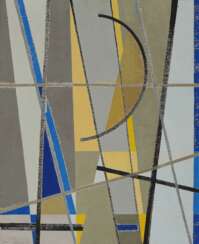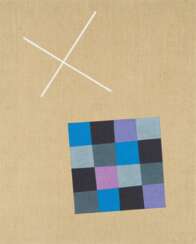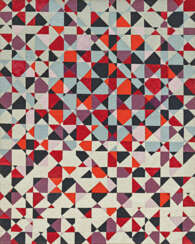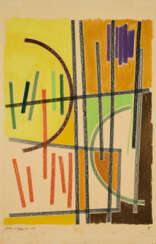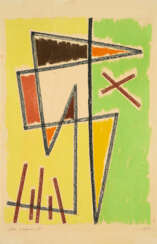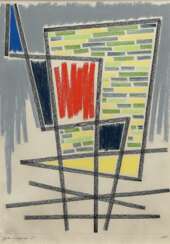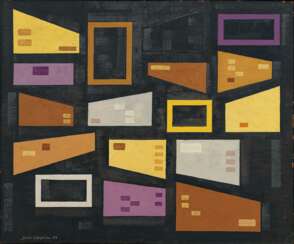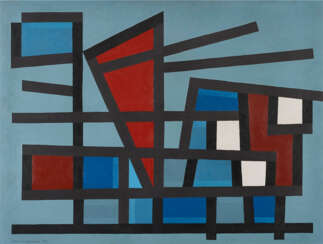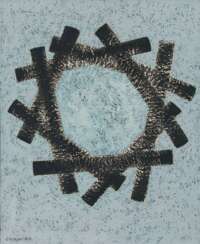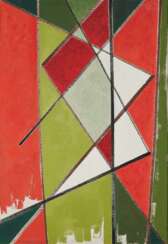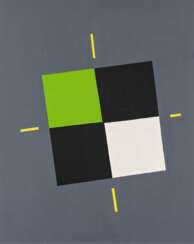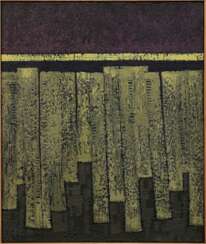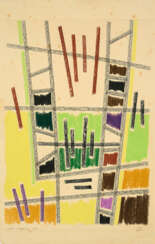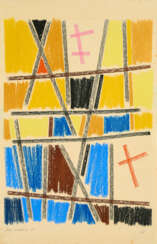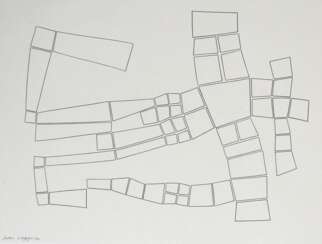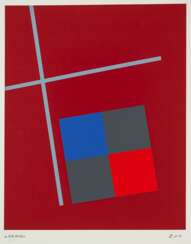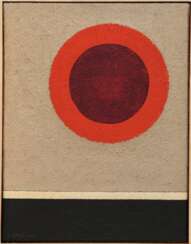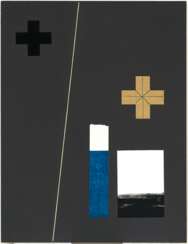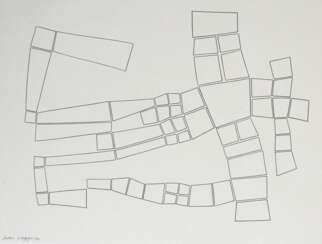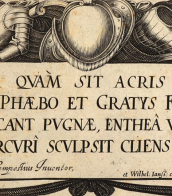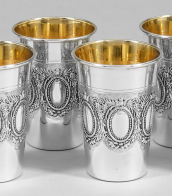jean leppien (1910 - 1991)
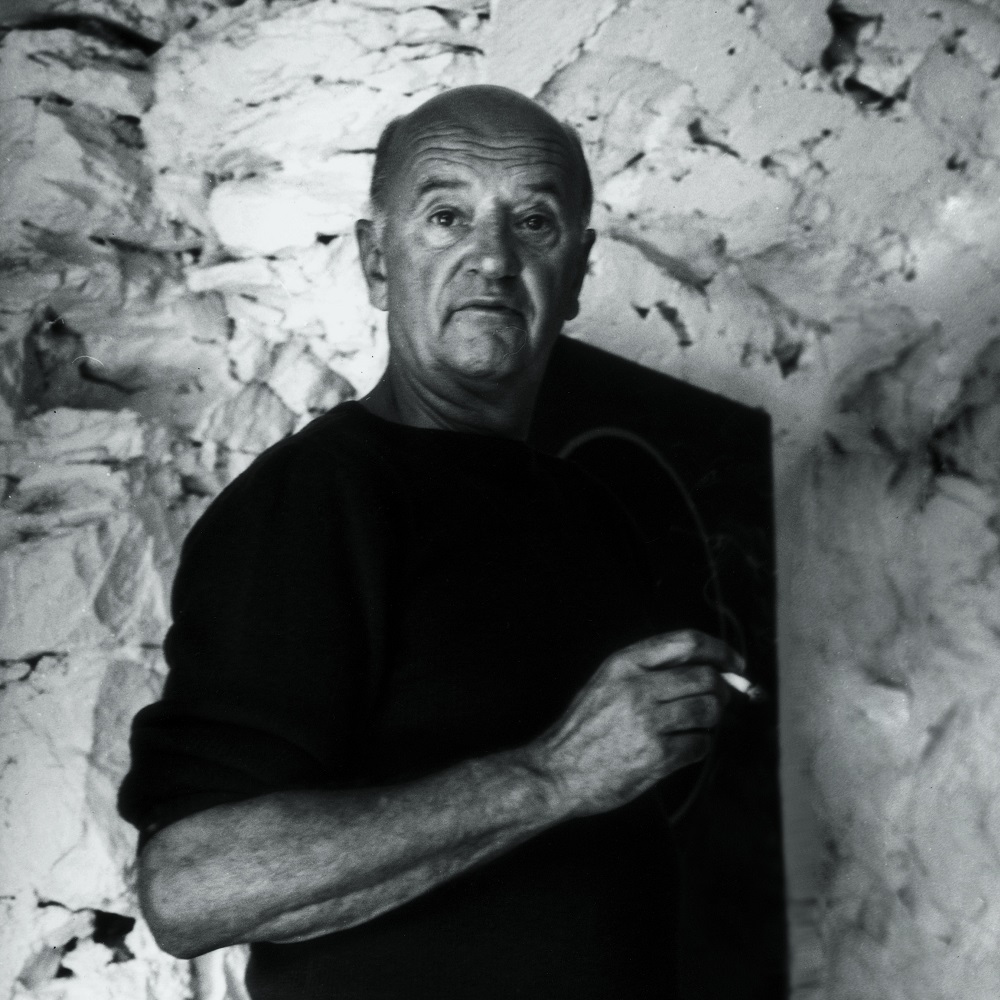
Jean Leppien (born Kurt Leppien) was a German-French painter.
From 1929, Leppien studied at the Bauhaus Dessau with Josef Albers, Wassily Kandinsky and Paul Klee. He lived in France since 1933, from where he was deported in 1944. After the war he stayed in France as Jean Leppien, where he exhibited at the Salon des Réalités Nouvelles. Leppien is one of the most important representatives of the Geometric abstraction in France. Stylistically, he is close to painters such as Alberto Magnelli, Jean Deyrolle, Michel Seuphor, Emile Gilioli and Aurélie Nemours.
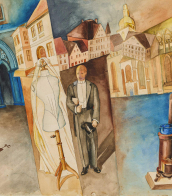

Jean Leppien (born Kurt Leppien) was a German-French painter.
From 1929, Leppien studied at the Bauhaus Dessau with Josef Albers, Wassily Kandinsky and Paul Klee. He lived in France since 1933, from where he was deported in 1944. After the war he stayed in France as Jean Leppien, where he exhibited at the Salon des Réalités Nouvelles. Leppien is one of the most important representatives of the Geometric abstraction in France. Stylistically, he is close to painters such as Alberto Magnelli, Jean Deyrolle, Michel Seuphor, Emile Gilioli and Aurélie Nemours.


Jean Leppien (born Kurt Leppien) was a German-French painter.
From 1929, Leppien studied at the Bauhaus Dessau with Josef Albers, Wassily Kandinsky and Paul Klee. He lived in France since 1933, from where he was deported in 1944. After the war he stayed in France as Jean Leppien, where he exhibited at the Salon des Réalités Nouvelles. Leppien is one of the most important representatives of the Geometric abstraction in France. Stylistically, he is close to painters such as Alberto Magnelli, Jean Deyrolle, Michel Seuphor, Emile Gilioli and Aurélie Nemours.
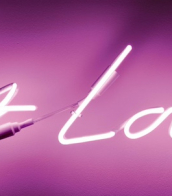

Jean Leppien (born Kurt Leppien) was a German-French painter.
From 1929, Leppien studied at the Bauhaus Dessau with Josef Albers, Wassily Kandinsky and Paul Klee. He lived in France since 1933, from where he was deported in 1944. After the war he stayed in France as Jean Leppien, where he exhibited at the Salon des Réalités Nouvelles. Leppien is one of the most important representatives of the Geometric abstraction in France. Stylistically, he is close to painters such as Alberto Magnelli, Jean Deyrolle, Michel Seuphor, Emile Gilioli and Aurélie Nemours.
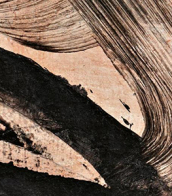

Jean Leppien (born Kurt Leppien) was a German-French painter.
From 1929, Leppien studied at the Bauhaus Dessau with Josef Albers, Wassily Kandinsky and Paul Klee. He lived in France since 1933, from where he was deported in 1944. After the war he stayed in France as Jean Leppien, where he exhibited at the Salon des Réalités Nouvelles. Leppien is one of the most important representatives of the Geometric abstraction in France. Stylistically, he is close to painters such as Alberto Magnelli, Jean Deyrolle, Michel Seuphor, Emile Gilioli and Aurélie Nemours.


Jean Leppien (born Kurt Leppien) was a German-French painter.
From 1929, Leppien studied at the Bauhaus Dessau with Josef Albers, Wassily Kandinsky and Paul Klee. He lived in France since 1933, from where he was deported in 1944. After the war he stayed in France as Jean Leppien, where he exhibited at the Salon des Réalités Nouvelles. Leppien is one of the most important representatives of the Geometric abstraction in France. Stylistically, he is close to painters such as Alberto Magnelli, Jean Deyrolle, Michel Seuphor, Emile Gilioli and Aurélie Nemours.
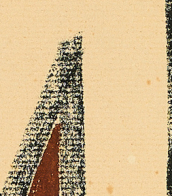

Jean Leppien (born Kurt Leppien) was a German-French painter.
From 1929, Leppien studied at the Bauhaus Dessau with Josef Albers, Wassily Kandinsky and Paul Klee. He lived in France since 1933, from where he was deported in 1944. After the war he stayed in France as Jean Leppien, where he exhibited at the Salon des Réalités Nouvelles. Leppien is one of the most important representatives of the Geometric abstraction in France. Stylistically, he is close to painters such as Alberto Magnelli, Jean Deyrolle, Michel Seuphor, Emile Gilioli and Aurélie Nemours.


Jean Leppien (born Kurt Leppien) was a German-French painter.
From 1929, Leppien studied at the Bauhaus Dessau with Josef Albers, Wassily Kandinsky and Paul Klee. He lived in France since 1933, from where he was deported in 1944. After the war he stayed in France as Jean Leppien, where he exhibited at the Salon des Réalités Nouvelles. Leppien is one of the most important representatives of the Geometric abstraction in France. Stylistically, he is close to painters such as Alberto Magnelli, Jean Deyrolle, Michel Seuphor, Emile Gilioli and Aurélie Nemours.
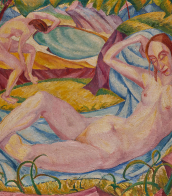

Jean Leppien (born Kurt Leppien) was a German-French painter.
From 1929, Leppien studied at the Bauhaus Dessau with Josef Albers, Wassily Kandinsky and Paul Klee. He lived in France since 1933, from where he was deported in 1944. After the war he stayed in France as Jean Leppien, where he exhibited at the Salon des Réalités Nouvelles. Leppien is one of the most important representatives of the Geometric abstraction in France. Stylistically, he is close to painters such as Alberto Magnelli, Jean Deyrolle, Michel Seuphor, Emile Gilioli and Aurélie Nemours.
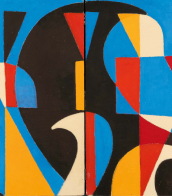

Jean Leppien (born Kurt Leppien) was a German-French painter.
From 1929, Leppien studied at the Bauhaus Dessau with Josef Albers, Wassily Kandinsky and Paul Klee. He lived in France since 1933, from where he was deported in 1944. After the war he stayed in France as Jean Leppien, where he exhibited at the Salon des Réalités Nouvelles. Leppien is one of the most important representatives of the Geometric abstraction in France. Stylistically, he is close to painters such as Alberto Magnelli, Jean Deyrolle, Michel Seuphor, Emile Gilioli and Aurélie Nemours.


Jean Leppien (born Kurt Leppien) was a German-French painter.
From 1929, Leppien studied at the Bauhaus Dessau with Josef Albers, Wassily Kandinsky and Paul Klee. He lived in France since 1933, from where he was deported in 1944. After the war he stayed in France as Jean Leppien, where he exhibited at the Salon des Réalités Nouvelles. Leppien is one of the most important representatives of the Geometric abstraction in France. Stylistically, he is close to painters such as Alberto Magnelli, Jean Deyrolle, Michel Seuphor, Emile Gilioli and Aurélie Nemours.
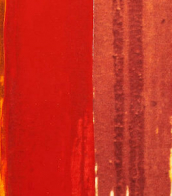

Jean Leppien (born Kurt Leppien) was a German-French painter.
From 1929, Leppien studied at the Bauhaus Dessau with Josef Albers, Wassily Kandinsky and Paul Klee. He lived in France since 1933, from where he was deported in 1944. After the war he stayed in France as Jean Leppien, where he exhibited at the Salon des Réalités Nouvelles. Leppien is one of the most important representatives of the Geometric abstraction in France. Stylistically, he is close to painters such as Alberto Magnelli, Jean Deyrolle, Michel Seuphor, Emile Gilioli and Aurélie Nemours.
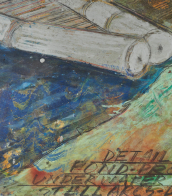

Jean Leppien (born Kurt Leppien) was a German-French painter.
From 1929, Leppien studied at the Bauhaus Dessau with Josef Albers, Wassily Kandinsky and Paul Klee. He lived in France since 1933, from where he was deported in 1944. After the war he stayed in France as Jean Leppien, where he exhibited at the Salon des Réalités Nouvelles. Leppien is one of the most important representatives of the Geometric abstraction in France. Stylistically, he is close to painters such as Alberto Magnelli, Jean Deyrolle, Michel Seuphor, Emile Gilioli and Aurélie Nemours.


Jean Leppien (born Kurt Leppien) was a German-French painter.
From 1929, Leppien studied at the Bauhaus Dessau with Josef Albers, Wassily Kandinsky and Paul Klee. He lived in France since 1933, from where he was deported in 1944. After the war he stayed in France as Jean Leppien, where he exhibited at the Salon des Réalités Nouvelles. Leppien is one of the most important representatives of the Geometric abstraction in France. Stylistically, he is close to painters such as Alberto Magnelli, Jean Deyrolle, Michel Seuphor, Emile Gilioli and Aurélie Nemours.
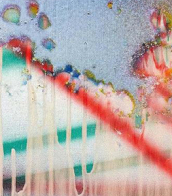

Jean Leppien (born Kurt Leppien) was a German-French painter.
From 1929, Leppien studied at the Bauhaus Dessau with Josef Albers, Wassily Kandinsky and Paul Klee. He lived in France since 1933, from where he was deported in 1944. After the war he stayed in France as Jean Leppien, where he exhibited at the Salon des Réalités Nouvelles. Leppien is one of the most important representatives of the Geometric abstraction in France. Stylistically, he is close to painters such as Alberto Magnelli, Jean Deyrolle, Michel Seuphor, Emile Gilioli and Aurélie Nemours.


Jean Leppien (born Kurt Leppien) was a German-French painter.
From 1929, Leppien studied at the Bauhaus Dessau with Josef Albers, Wassily Kandinsky and Paul Klee. He lived in France since 1933, from where he was deported in 1944. After the war he stayed in France as Jean Leppien, where he exhibited at the Salon des Réalités Nouvelles. Leppien is one of the most important representatives of the Geometric abstraction in France. Stylistically, he is close to painters such as Alberto Magnelli, Jean Deyrolle, Michel Seuphor, Emile Gilioli and Aurélie Nemours.
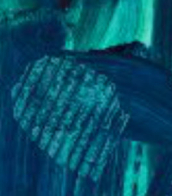

Jean Leppien (born Kurt Leppien) was a German-French painter.
From 1929, Leppien studied at the Bauhaus Dessau with Josef Albers, Wassily Kandinsky and Paul Klee. He lived in France since 1933, from where he was deported in 1944. After the war he stayed in France as Jean Leppien, where he exhibited at the Salon des Réalités Nouvelles. Leppien is one of the most important representatives of the Geometric abstraction in France. Stylistically, he is close to painters such as Alberto Magnelli, Jean Deyrolle, Michel Seuphor, Emile Gilioli and Aurélie Nemours.


Jean Leppien (born Kurt Leppien) was a German-French painter.
From 1929, Leppien studied at the Bauhaus Dessau with Josef Albers, Wassily Kandinsky and Paul Klee. He lived in France since 1933, from where he was deported in 1944. After the war he stayed in France as Jean Leppien, where he exhibited at the Salon des Réalités Nouvelles. Leppien is one of the most important representatives of the Geometric abstraction in France. Stylistically, he is close to painters such as Alberto Magnelli, Jean Deyrolle, Michel Seuphor, Emile Gilioli and Aurélie Nemours.
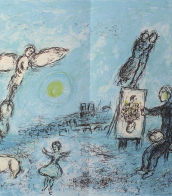

Jean Leppien (born Kurt Leppien) was a German-French painter.
From 1929, Leppien studied at the Bauhaus Dessau with Josef Albers, Wassily Kandinsky and Paul Klee. He lived in France since 1933, from where he was deported in 1944. After the war he stayed in France as Jean Leppien, where he exhibited at the Salon des Réalités Nouvelles. Leppien is one of the most important representatives of the Geometric abstraction in France. Stylistically, he is close to painters such as Alberto Magnelli, Jean Deyrolle, Michel Seuphor, Emile Gilioli and Aurélie Nemours.
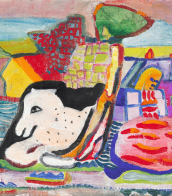

Jean Leppien (born Kurt Leppien) was a German-French painter.
From 1929, Leppien studied at the Bauhaus Dessau with Josef Albers, Wassily Kandinsky and Paul Klee. He lived in France since 1933, from where he was deported in 1944. After the war he stayed in France as Jean Leppien, where he exhibited at the Salon des Réalités Nouvelles. Leppien is one of the most important representatives of the Geometric abstraction in France. Stylistically, he is close to painters such as Alberto Magnelli, Jean Deyrolle, Michel Seuphor, Emile Gilioli and Aurélie Nemours.


Jean Leppien (born Kurt Leppien) was a German-French painter.
From 1929, Leppien studied at the Bauhaus Dessau with Josef Albers, Wassily Kandinsky and Paul Klee. He lived in France since 1933, from where he was deported in 1944. After the war he stayed in France as Jean Leppien, where he exhibited at the Salon des Réalités Nouvelles. Leppien is one of the most important representatives of the Geometric abstraction in France. Stylistically, he is close to painters such as Alberto Magnelli, Jean Deyrolle, Michel Seuphor, Emile Gilioli and Aurélie Nemours.
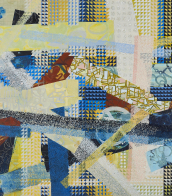

Jean Leppien (born Kurt Leppien) was a German-French painter.
From 1929, Leppien studied at the Bauhaus Dessau with Josef Albers, Wassily Kandinsky and Paul Klee. He lived in France since 1933, from where he was deported in 1944. After the war he stayed in France as Jean Leppien, where he exhibited at the Salon des Réalités Nouvelles. Leppien is one of the most important representatives of the Geometric abstraction in France. Stylistically, he is close to painters such as Alberto Magnelli, Jean Deyrolle, Michel Seuphor, Emile Gilioli and Aurélie Nemours.

